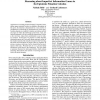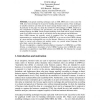138 search results - page 21 / 28 » Modelling Object Typicality in Description Logics |
AAAI
2010
13 years 8 months ago
2010
Approaches to reasoning about knowledge in imperfect information games typically involve an exhaustive description of the game, the dynamics characterized by a tree and the incomp...
RML
2002
13 years 7 months ago
2002
Conceptual modeling techniques such as EER, ORM and to some extent the UML have been developed in the past for building information systems. These techniques or suitable extensions...
FMCO
2003
Springer
14 years 19 days ago
2003
Springer
Web services security specifications are typically expressed as a mixture of XML schemas, example messages, and narrative explanations. We propose a new specification language fo...
ECEASST
2008
13 years 7 months ago
2008
The OCL (Object Constraint Language) as part of the UML (Unified Modeling Language) is a rich language with different collection kinds (sets, multi-sets, sequences) and a large var...
GIS
1992
ACM
13 years 11 months ago
1992
ACM
Machine learning techniques such as tree induction have become accepted tools for developing generalisations of large data sets, typically for use with production rule systems in p...


